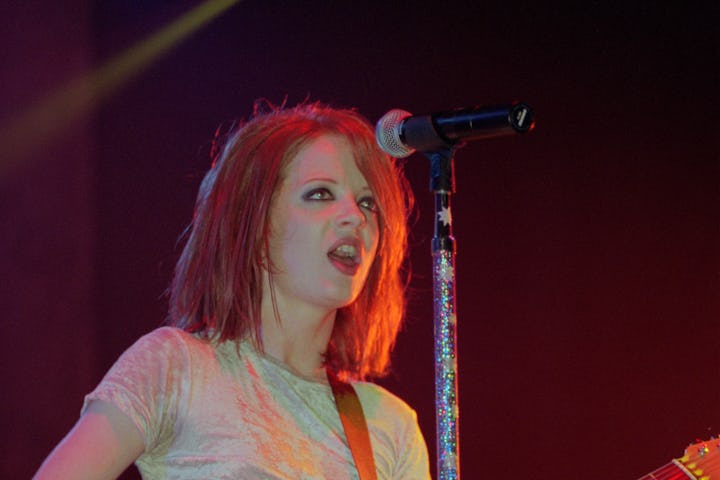28 Years Ago, One Perfect Band Dropped The Most Subversive Album Of The 90s
We're still only happy when it rains.

Is Garbage the best alternative band of the 90s? Or is Garbage the best Britpop band of the 90s? Are they post-grunge or a pop band with 80s rock roots? The answer to all of these questions is yes, and also no simultaneously. If 90s music has an intersection where nearly everything connects, it’s probably on the first self-titled Garbage album. On August 15, 1995, Garbage dropped Garbage and redefined various genres of music, while also giving the world some of the most memorable and intelligent rock songs of all time. Almost three decades after its release, it's not so much that we have nostalgia for Garbage, it’s simply that you can’t imagine good rock music without it. If our kids are looking for one album that will teach them about how great music is made, Garbage is that album.
In the year 2023, Garbage is one of the best live bands you’ll ever see in your life. But why? Steve Marker and Duke Erikson’s flawless talents as a guitarist is certainly part of it. On the first track of Garbage, “Supervixen,” the guitar sounds like a U2 riff traveled from the 80s, got dragged through the muck of grunge, and then was reborn as some kind of new 90s rock alien. This sonic quantum dissonance is also intentional: Marker and Erikson, along with Butch Vig, were really into remixing U2 and Depeche Mode before they formed Garbage. As a live band, their shared love of various different musical styles is clear, but what makes that translate onto the record is the intentional and clean production tactics of Butch Vig.
Garbage in 1995: Steve Marker, Butch Vig, Duke Erikson, and Shirley Manson.
Prior to forming Garbage, Vig was an extremely successful producer, probably best known as the guy who produced Nirvana’s Nevermind. Yes, the leap from the unfocused scream of Bleach, to the masterpiece of Nevermind is partly the result of the man who still plays the drums for Garbage. When you see Butch Vig on stage today, you’re seeing a person who shaped the sound of everything we listen to.
But of course, Garbage isn’t really like Nirvana. And if the album Garbage sounds like Nevermind, that comparison is superficial. And that’s because the three guys who started Garbage — Vig, Marker, and Erikson — knew they needed to push back against new rock bands that were dominated by dudes. Basically, Garbage wanted to become the Blondie of the 90s, and they needed their Debbie Harry. Enter Shirley Manson.
Before Garbage, Shirley Manson was in a short-lived Scottish band called Angelfish. So, how did a Scottish singer find herself in an American post-grunge band? Thank MTV. While searching for their dream lead singer, Steven Marker saw the music video for Angelfish’s “Suffocate Me,” and immediately wanted to get Manson into Garbage. This may seem like Garbage is contrived, or self-consciously self-aware, but again, what makes this first album, and the legacy of the band in general, is that every single member is an out-of-control talent machine. The boys in Garbage needed Shirley Manson because game recognizes game.
Even if you’re fuzzy on the 1995 album Garbage you certainly remember the rock fuzz effect it created. Despite their ironic name, Garbage never sounds dirty or garage-rocky. There’s a dance-inspired beat to every single song on the record, even the slower jams like “A Stroke of Luck.” The band didn’t want to be perceived as another grunge rock band, and so, the pop elements fused with Manson’s utterly unique voice to create a record that seemed familiar for 90s kids, but was secretly very new.
Shirley Manson in 1996.
There are two songs on Garbage that kinda overshadow the rest of the record: “Stupid Girl,” and “Only Happy When It Rains.” Both of these songs are rock classics, and are, in many ways, the anti-No Doubt. No shade on Gwen Stefani, but you can’t imagine “Stupid Girl” making it onto the Captain Marvel soundtrack, because it has too many layers of irony and mockery for some contemporary audiences. Manson co-wrote the lyrics with all three other band members, and on “Stupid Girl,” she’s throwing down a feminist gauntlet just as brazen and powerful as Alanis Morissette’s first record. If you don’t see how Manson is giving the middle finger to sexism while rocking harder than any of her peers, then you just don’t get this band. “Stupid Girl” is Manson saying that it’s okay for her rock band to be smarter than you.
Meanwhile, “Only Happy When It Rains,” did the unthinkable: In one song, Garbage managed to unite the goth kids, the alternative kids in flannels, and the rest of us who were wearing sunglasses inside, still obsessed with The Smiths and just starting to get into Oasis and Radiohead. “Only Happy When It Rains,” might be the best song of the 90s, mostly because it's so relatable, but also because it's catchy as hell. If Garbage the album represents the eclectic sound of the 90s, and the various ways it connects to the past and future, then “Only Happy When It Rains,” is the perfect song to represent the album. No matter how overplayed you think this song is, it’s still a tiny bit underrated.
“Only Happy When It Rains,” and the rest of Garbage lets everyone — from kids to their old millennial parents — revel in moodiness. We’re only happy when it's complicated, and if you can’t appreciate it, feel free to overlook this album as 90s trash that you don’t get. For the rest of us, pouring out this misery still feels amazing.